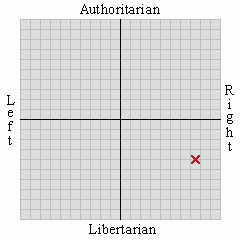 So here we have it - the 'power revolution' as Deputy PM Clegg calls it. He wants to "transform our politics so the state has far less control over you, and you have far more control over the state".
So here we have it - the 'power revolution' as Deputy PM Clegg calls it. He wants to "transform our politics so the state has far less control over you, and you have far more control over the state".Good start.
We have some good things here - repealing "all of the intrusive and unnecessary laws that inhibit [our] freedom" - his words, not mine. Seeing ID cards out, the DNA database something for criminals and not the innocent, CCTV regulated, ContactPoint gone - it's all very British and, indeed, very liberal. The devolution of power, the localism - "you know better than I do about how to run your life, your community, the services you use" he says, espousing the very socialist calculation problem that we conservatives have always fought against. Checks on the power of lobbyists that sometimes gives interest groups too much power, that ties up the same big business and minority interest groups up with big government - it's all very small-government.
There are the bad - he wants to make the tax system "fairer" rather than reducing the burden overall - power to people really involves giving them their money back to spend how they want, not for government to spend on their behalf on something that doesn't benefit them, is an utter gimmick, or when the individual could spend the money much more efficiently on something that would benefit them more. The rise in the income tax threshold to £10,000 is very fair and will get more people off welfare than anything else, but funding it by a rise in CGT will, as Lord Forsyth argued in the Telegraph today, actually stop the jobs that these people might go into being created. The idea of Redwood et al, to tax short term investment a higher rate than long term investment, is far more sensible; even more radical would be to scrap CGT altogether and to allow the investment to just take place without the distortions that CGT brings.
And surely this nonsense about allowing government ministers to vote in the backbench 1922 Committee can't go ahead. A government, saying it wants to encourage localism and democracy, who then tries to practically abolish the backbenchers' forum is purely hypocritical.
Clegg said earlier:
"We don't, unlike Labour, believe that change in our society must be forced from the centre.
Unlike the previous Labour government, we're not insecure about relinquishing control."
This government will be made or broken on whether it gives power back to people. Labour has centralised, put power in the hands of the state. If Cameron can revive classical liberalism, bring that out of the Lib Dems, really works towards making the state smaller, society stronger and individuals more powerful when it comes to their own lives, then this coalition will work. If, however, he sells out to the crazy elements of the Lib Dems (PR, 'fairness', 'liberalism' etc) then the internal coalition will rebel, and the government will fall.
We will wait and see.





No comments:
Post a Comment
Comment on posts here, and all posts whether critical or in agreement are fine as long as they are not abusive. Comments are moderated due to Chinese spambots.